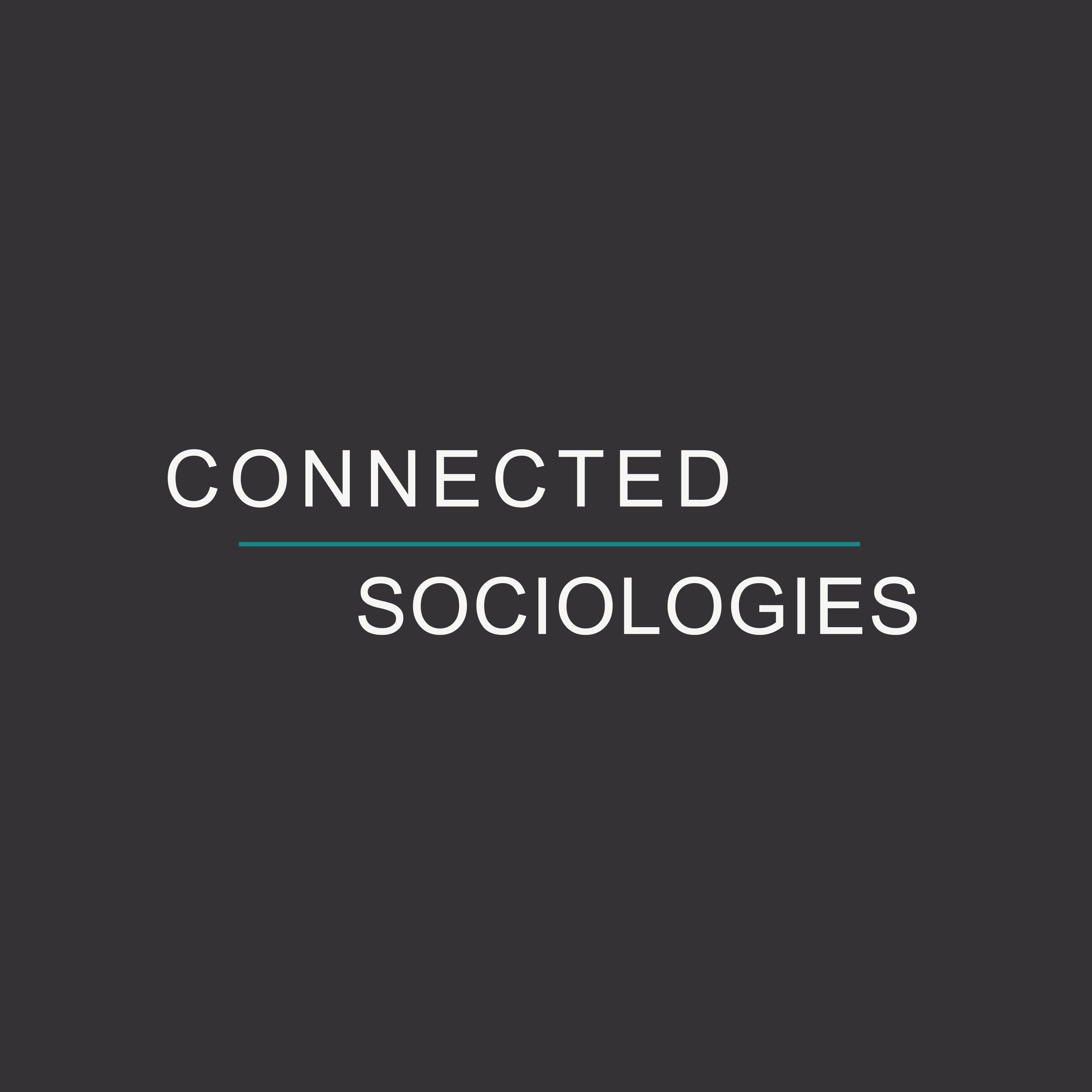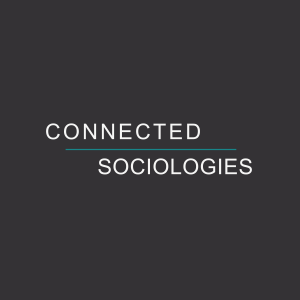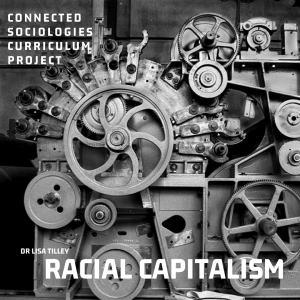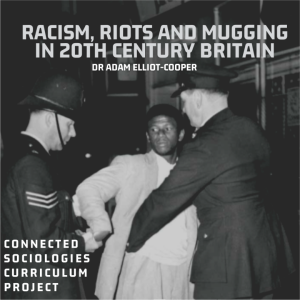
7.4K
Downloads
32
Episodes
Sociology is based on a conventional view of the emergence of modernity and the ‘rise of the West’. This privileges mainstream Euro-centred histories. Most sociological accounts of modernity, for example, neglect broader issues of colonialism and empire. They also fail to address the role of forced labour alongside free labour, issues of dispossession and settlement, and the classification of societies and peoples by their ‘stages of development’. The Connected Sociologies Curriculum Project responds to these challenges by providing resources for the reconstruction of the curriculum in the light of new connected histories and their associated connected sociologies. The project is designed to support the transformation of school, college, and university curricula through a critical engagement with the broader histories that have shaped modern societies.
Sociology is based on a conventional view of the emergence of modernity and the ‘rise of the West’. This privileges mainstream Euro-centred histories. Most sociological accounts of modernity, for example, neglect broader issues of colonialism and empire. They also fail to address the role of forced labour alongside free labour, issues of dispossession and settlement, and the classification of societies and peoples by their ‘stages of development’. The Connected Sociologies Curriculum Project responds to these challenges by providing resources for the reconstruction of the curriculum in the light of new connected histories and their associated connected sociologies. The project is designed to support the transformation of school, college, and university curricula through a critical engagement with the broader histories that have shaped modern societies.
Episodes

Monday May 17, 2021
Political Economy and the Environment - Dr Keston Perry
Monday May 17, 2021
Monday May 17, 2021
Debates in political economy have shifted from resource extraction as a means of accumulation under capitalism to consider how workers, indigenous peoples, Black and other marginalized communities are dispossessed through climate devastation and breakdown. Yet political economy has almost remained silent about the ways in which commodification in faraway places in the Global South, in particular the Caribbean that constituted plantation economies. These spaces comprised the most important resources for colonial powers (e.g. sugar, oil, coffee, and cotton, copper among others) to accumulate capital. Natural spaces served as extractive landscapes for accumulation by metropolitan centers of power are today responsible for more than 70 per cent of greenhouse gas emissions and became precursors for environment destruction, overexploitation, and resource overuse. These problems all contribute today to the uneven effects of climate breakdown and source of various climate injustices.
Reading
- Bullard, R. D. (1993) ‘The Threat of Environmental Racism’, Natural Resources & Environment, 7(3), pp. 23–56.
- Perry, K. K. (2020) ‘For politics, people, or the planet? The political economy of fossil fuel reform, energy dependence and climate policy in Haiti’, Energy Research & Social Science, 63, p. 101397.
- Rojas-Páez, G. (2017) ‘Understanding Environmental Harm and Justice Claims in the Global South: Crimes of the Powerful and Peoples’ Resistance’, in Rodríguez Goyes, D. et al. (eds) Environmental Crime in Latin America: The Theft of Nature and the Poisoning of the Land. London: Palgrave Macmillan UK (Palgrave Studies in Green Criminology), pp. 57–83.
- Sealey-Huggins, L. (2017) ‘“1.5°C to stay alive”: climate change, imperialism and justice for the Caribbean’, Third World Quarterly, 38(11), pp. 2444–2463.
Resources
Wynter, S. (1994) ‘1492: A New World View” in eds. Vera Lawrence Hyatt and Rex Nettleford, Race, Discourse and the Origin of the Americas: A New World New. Pp. 5-57.
Questions for Discussion
- What is the history of political economy and the environment from a Global South perspective?
- How does political economy take account of resource extraction, accumulation and effects of colonialism on the environment?
- In what ways have changes in environment reflect relations of power between global north and south?
- What is the relationship between the plantation economy and the environment? What are some blindspots in the political economy with respect to environment and the global south?
- To what extent are histories of dispossession, appropriation, colonization and enslavement present within new regimes of finance and accumulation regarding responses to climate change? Give examples

Monday Apr 19, 2021
The Grunwick strike - Prof Sundari Anitha
Monday Apr 19, 2021
Monday Apr 19, 2021
Dominant representations of South Asian women in Britain locate them within their family and community lives; the women themselves are constructed as passive, confined to the domestic sphere and lacking agency. Their roles as citizens, as workers and as active members of trade unions who have contributed to the struggles for workers’ rights in the UK is elided in historical accounts and contemporary popular discourses. The Grunwick strike that took place in the late 1970s was one of the many occasions when South Asian women fought for their rights as workers. The focus of this session the Grunwick strike and its legacy for the broader struggles against racism and exploitation at work.
Reading
- Anitha, S. and Parmar, M. (undated) ‘On the picket line: Jayaben Desai from East Africa to Grunwick’, Our Migration Story.
- Anitha, s. and Pearson, R. (2021) 'The Grunwick protests: remembering the 1970s strike for migrant workers’ rights', BBC History Magazine.
- Anitha, S., Pearson, R. and McDowell, L. (2018) From Grunwick to Gate Gourmet: South Asian Women’s industrial activism and the role of trade unions. Revue Francaise de Civilisation Britannique. XXIII-1 | Online since 20 March 2018.
Resources
- Educational resources on migration, history of women and work and on the Grunwick dispute: www.striking-women.org
- The comic Striking Women: https://www.striking-women.org/sites/striking-women.org/files/striking_women_for_download_opt.pdf
- BBC Radio 4: Great Lives – On Jayaben Desai, the leader of the Grunwick dispute: https://www.bbc.co.uk/programmes/b09yddxk
Questions for Discussion
- Why was there a need for organising specifically by women?
- Who were the women involved in the Grunwick strike? How did their location at the intersection of gender, race and class shape their experience of oppression and exploitation at work?
- Though the Grunwick strikers failed to meet their objectives, why do we consider their struggles an important moment in British labour history?
- What is outsourcing, and how did this effect the experiences of the women workers at Gate Gourmet?
- What challenges do workers face in contemporary UK?

Monday Apr 19, 2021
School to Prison Pipeline - Dr Karen Graham
Monday Apr 19, 2021
Monday Apr 19, 2021
The potential link between educational ‘failure’ and offending is often debated. Discussions frequently focus on the community, cultural or family backgrounds from which the children who ‘fail’ come, and/or on more adequate provision for those ‘at risk’ of school and social exclusion. These discussions often prioritise the apparent significance of race, class and gender, indicated by the over-representation of poor, male, Black students in punitive school disciplinary processes and a parallel disproportionality in the criminal justice system. However, many of these approaches assume educational systems to be intrinsically good and consider cases of educational failure to be anomalies that require ironing out. This session will consider a different view. Drawing on classic sociological theories of education it will introduce the connections between social control and education. It will also ask us to consider what an exploration of the school-to-prison pipeline can tell us about the entire education system.
Readings
- Bowles, S. and Gintis, H. (2002) Schooling in Capitalist America Revisited. Sociology of Education, 75(1): 1-18.
- Davis, A. Y. (2003) Are Prisons Obsolete? New York: Seven Stories Press.
- Foucault, M. (1991) Discipline and Punish. The Birth of the Prison. London: Penguin Books Ltd.
- Graham, K. (2014) Does school prepare men for prison? City: analysis of urban trends, culture, theory, policy, action, 18(6): 824-836.
- Graham, K. (2016) The British School-To-Prison Pipeline. In L.A. Palmer and K Andrews (Eds) Blackness in Britain. London: Routledge.
- Perera, J. (2020) How Black Working-Class Youth are Criminalised and Excluded in the English School System. A London Case Study. London: Institute of Race Relations.
- Willis, P. (1977) Learning to Labour. How working class kids get working class jobs. Aldershot: Ashgate Publishing Ltd.
Resources
- Biopower – Global Social Theory website
- Changing education paradigms – Sir Ken Robinson RSA Animate on YouTube
- Does school prepare men for prison? – Centre for Crime and Justice comment piece by Karen Graham
Questions for Discussion
- What is the myth of meritocracy in education and how might it link to wider social inequalities?
- How and why have ideas around the disruptive pupil deserving of exclusion and the criminal deserving of imprisonment been historically racialised, classed and gendered?
- What can the school-to-prison pipeline teach us about the wider system of education? What impact might the hidden curriculum of schooling be having on everyone?

Monday Apr 19, 2021
Policing in Postcolonial Continental Europe - Dr Vanessa E. Thompson
Monday Apr 19, 2021
Monday Apr 19, 2021
The global protests and mobilisation for Black lives crystallised around policing, although simultaneously pointing at the broader dimensions of criminalisation and control of especially Black and other racialised poor folks and communities. The protests unfolded globally very quickly, also in many parts of continental Europe such as Germany, France and Switzerland. In this session, we explore the differential logics of policing in Europe, which are connected to the histories of empire, colonialism and racial gendered capitalism. We consider the functions and logics of policing, its relation to violence and safety and explore possible alternatives.
Reading
- Eddie Bruce-Jones (2014), “German policing at the intersection: race, gender, migrant status and mental health”, Race & Class, 56(3): 36-49.
- Frantz Fanon (1963), The Wretched of the Earth, New York: Grove.
- Muschalek, Marie (2019), Violence as Usual: Policing and the Colonial State in German Southwest Africa, Ithaca, Cornell University Press.
- Simone Browne (2015), Dark Matters: On the Surveillance of Blackness, London: Duke University Press.
- Stuart Hall et al. (1978), Policing the Crisis. Mugging, the State, and Law an Order, London: Palgrave.
- Vanessa E. Thompson (2018), “There is no justice, there is just us! Ansätze zu einer postkolonial-feministischen Kritik der Polizei am Beispiel von Racial Profiling“, in: Daniel Loick (Ed.): Kritik der Polizei, Frankfurt/Main: Campus, pp. 197-221. (English translation to be published in: Michael J. Coyle and Mechthild Nagel (Ed.): Contesting Carceral Logic: Knowledge and Praxis in Penal Abolition).
Resources
Questions
- What is the significance of the differential logic of policing to our understanding of safety?
- What are further intersectional systems of oppression that play into policing (such as gender or migration status)?
- What could make communities safe? What are possible alternatives to policing?

Monday Apr 19, 2021
Indian Indenture in the British Empire - Dr Maria del Pilar Kaladeen
Monday Apr 19, 2021
Monday Apr 19, 2021
Between 1834 and 1920, two million men women and children were taken from India, by the British, to labour on sugar colonies across the Empire under temporary contracts called indentures. The majority of these workers never returned to India and the system of indenture, under which they were bound, has all but been erased from British colonial history. In this lecture, I reflect on how and why this silencing took place. I additionally refer to acts and forms of resistance utilised by indentured labourers and share ideas about the important contemporary contributions of the global Jahaji Bhai – the international indentured labour diaspora – who are currently working towards greater public knowledge of the system of indenture and its legacies.
Readings
- Kaladeen, Maria del Pilar 2018. Windrushed, Wasafiri, 33:2, 22-25
- Kempadoo, K. 2017. ‘Bound Coolies’ and Other Indentured Workers in the Caribbean: Implications for debates about human trafficking and modern slavery. Anti-Trafficking Review, (9).
- Mishra, Margaret 2016. 'Your Woman is a Very Bad Woman': Revisiting Female Deviance in Colonial Fiji Journal of International Women's Studies
Resources
- Sundar Anitha and Ruth Pearson Indentured labour from South Asia (1834-1917)
- Heidi Safia Mirza: 'The Golden Fleece': The Windrush quest for educational desire
- Maria del Pilar Kaladeen: Hidden Histories: Indenture to Windrush
- Deirdre Mckay: Debt bondage, domestic servitude and indentured labour still a problem in the world’s richest nations
Questions for discussion
- The majority of British people are unaware of the system of indenture across the former empire. What do you think accounts for the historical silence around this history?
- What do you think was significant about the ways in which labourers managed to organise and resist the system of indenture?
- Do you think people have the same lack of awareness in relation to contemporary forms of unfree labour? Do we make connections between the products we consume and the welfare and conditions of the people involved in their production?

Monday Apr 19, 2021
Monday Apr 19, 2021
Full integration requires some degree of subjective identification with the society or country as a whole. How to integrate difference so that difference ceases to be problematic? Four modes of integration are discussed in order to bring out the character of multiculturalism and its relation to liberty, equality and solidarity – the core components of national citizenship. The key difference between multiculturalism and other modes of integration is the normative significance it gives to minority racial, ethnic and religious groups, not just individuals and organisations, within national citizenship. The recent emphasis on cohesion and citizenship is a rebalancing of the political multiculturalism of the 1990s, which largely took the form of accommodation of groups while being ambivalent about national identity and taking cohesion at a local level for granted. Dialogical remaking of the national identity from the bottom up as well as by the state has been taking place but is also being resisted by those who cluster around mono-nationalism and anti-national cosmopolitanism.
Reading
- Modood, T. (2018). A Multicultural Nationalism. Brown J. World Aff., 25, 233.
- Brahm Levey, G. (2019). The Bristol school of multiculturalism. Ethnicities, 19(1), 200-226.
- Four inter-related Multiculturalist blogs in the context of the Black Lives Matter agitation in Britain in 2020:
- Uberoi, V. Can Black lives really matter in the UK before addressing Britishness? Global Extremes, Open Democracy, 9 July, 2020
- Meer, N. Britain had a chance to talk about race 20 years ago. Let's get it right this time, The Guardian, 12 July, 2020.
- Sealy, T. Back to the future of multi-ethnic Britain, Global Extremes, Open Democracy, 21 July, 2020
- Sealy, T. What can multiculturalism offer in the fight against racism in Britain?, Global Extremes, Open Democracy, 23 November, 2020
- Minorities, Public Labels and Multiculturalism, Department of Sociological Studies, University of Sheffield, 28 October 2020 (34 minutes recorded lecture).
Resources
The Symposium on The Bristol School of Multiculturalism, Ethnicities
Questions for Discussion
- Does it make sense to think of Multiculturalism in terms of liberty, equality and solidarity amongst national citizens?
- What is the difference between multiculturalism and other modes of integration?
- Is the main thrust of multiculturalism separationist or remaking the basis for national solidarity?

Monday Apr 19, 2021
Policing in Schools - Dr Remi Joseph-Salisbury
Monday Apr 19, 2021
Monday Apr 19, 2021
In recent years there have been repeated high-profile calls to increase the number of school-based police officers. Whilst police are becoming an increasingly normalised presence in British schools, there is a need for closer scrutiny of the potential problematics of this development. Wider evidence of institutional racism in both policing and schooling, suggests that the presence of police in schools may raise issues in terms of race and racism. There are also issues with regard to social class and other structural factors, including disability and sexuality. In this session, we explore the issue of police in schools with a particular focus on racism. We will explore recent evidence on police in schools, in order to better understand this contemporary issue.
Readings
- Connelly, L., Legane, R., and Joseph-Salisbury, R. 2020. Connelly, L., Legane, R., and Joseph Salisbury, R. 2020. Decriminalise the Classroom: A community response to police in Greater Manchester schools, No Police in Schools.
- Nijjar, J. 2020. Police–school partnerships and the war on black youth, Critical Social Policy .
- Joseph-Salisbury, R. 2020. Race and Racism in English Secondary Schools, Runnymede Trust.
- ACLU (American Civil Liberties Union) (2017) Bullies in Blue: The Origins and Consequences of School Policing. New York: ACLU.
- Henshall, A. 2018.Are police officers in schools a force for good? Schools Week, 26th May 2018.
- Chechi-Ribeiro, V. 2020. Why the Police Have No Place in Schools, The Guardian, 5th September, 2020.
Resources
- No Police in Schools
- Surviving Society Podcast – Racism and Police in Schools
Questions for Discussion
- How can wider evidence on institutional racism inform our explorations of police in schools?
- What are some of the key issues with the increased presence of police in schools?
- What alternatives can we think of to police in schools? Using our imaginations, and our own experiences, what kind of learning environments can we envision to improve the educational experiences of young people?

Monday Apr 19, 2021
Colonialism, Immigration and the Making of British citizenship
Monday Apr 19, 2021
Monday Apr 19, 2021
Reading
- Gentleman, Amelia. 2019. The Windrush Betrayal: Exposing the Hostile Environment. London: Guardian Faber Publishing.
- Hampshire, James 2005. Citizenship and Belonging: Immigration and the Politics of Demographic Governance in Post-war Britain. Basingstoke: Palgrave.
- Hansen, Randall. 2000. Citizenship and Immigration in Post-war Britain. Oxford: Oxford University Press.
- Paul, Kathleen. 1997. Whitewashing Britain: Race and Citizenship in the Post-war Era. Ithaca: Cornell University Press.
Resources
- National Archives resources on experiences of immigration to the UK.
- Migration Museum resources.
- Migration Observatory overview of migrants in the UK.
Questions for discussion
- What does the development of citizenship tell us about the British state and its postcolonial identity?
- What role has racism played in shaping Britain’s citizenship and immigration regime?
- In what ways do the legacies of postcolonial citizenship affect the lives of ethnic minority Britons today?

Wednesday Feb 24, 2021
Racial Capitalism - Dr Lisa Tilley
Wednesday Feb 24, 2021
Wednesday Feb 24, 2021
An intellectual product of the Black Radical Tradition, ‘racial capitalism’ was first expansively developed as an account of the historical origins and embedded logics of global capitalism by Cedric Robinson in his key text Black Marxism. This session introduces students to the idea of racial capitalism and explains how it helps us to understand the centrality of race to the formation of capitalism. We will also consider how racial capitalism helps us to remain attuned to the constant production and reproduction of difference; and the exploitation and expropriation of those who are differentiated as ‘inferior’. But, perhaps most importantly, we’ll also cover how racial capitalism asks us to pay attention to those who should be more celebrated as key revolutionary subjects of history – the enslaved, the maroons, anticolonial plantation workers, migrant workers, and others who may not fit the frame of the ideal working class figure, but who have done so much to deliver rights and justice globally.
Readings
- Robinson, C. J. (2000). Black Marxism: The Making of the Black Radical Tradition. University of North Carolina Press.
- Bhattacharyya, G. (2018). Rethinking Racial Capitalism: Questions of Reproduction and Survival. Rowman & Littlefield.
- Kelley, R. D. (2017). What did Cedric Robinson mean by racial capitalism? Boston Review, 12.
- Gilmore, R. W. (2020) Geographies of Racial Capitalism. Antipode Online
- Gilmore, W. R. (forthcoming 2021). Change Everything: Racial Capitalism and the Case for Abolition. Haymarket Books.
Resources
- Racial Capitalism – Global Social Theory
- Pulido, L. (2016). Flint, Environmental Racism, and Racial Capitalism. Capitalism Nature Socialism.
- Hudson, P. J. (2017). Bankers and Empire: How Wall Street Colonized the Caribbean. University of Chicago Press.
Questions for Discussion
- How does broadening the focus from the European proletarian experience to the organising and revolts of the unfree labourers of the (formely) colonised world cause us to revise dominant understandings of historical change?
- How does racial capitalism help us to understand the complex relationship between inclusion and exclusion?
- What, according to Cedric Robinson, are the roots of the Black Radical Tradition?
- In what ways are racial and nationalist interests mobilised by elites against collective class interests?

Tuesday Feb 16, 2021
Colonial Policing Comes Home
Tuesday Feb 16, 2021
Tuesday Feb 16, 2021
Britain in the 1970s and 80s saw the rise of a new generation of black and Asian youth who, unlike the previous generation, had been born in Britain. They were not migrants like their parents, and demanded to part of Britain. At the same time, black and Asian youth were a useful scapegoat for a government unable to deal with economic crisis and rising unemployment. Creating the impression that ethnic minorities brought criminality and violence to Britain brought with it two things: 1) Forms of racist, violent policing which had previously been used in the colonies, and 2) Mass resistance and rebellion against this police racism, led by young people in urban areas.
Readings
- Hall et. al. (1978) Chapter 10: The Politics of ‘Mugging’, in Policing the crisis: Mugging, the State and Law and Order, London: Palgrave Macmillan.
- Trafford, J (2020) Riot Redactions, Colonial Reverberations. New Socialist.
- Linstrum, E (2019) Domesticating Chemical Weapons: Tear Gas and the Militarization of Policing in the British Imperial World, 1919–1981. The Journal of Modern History. 91, 3.
- Jennifer Davis, From ‘Rookeries’ to ‘Communities’: Race, Poverty and Policing in London, 1850–1985, History Workshop Journal, Volume 27, Issue 1, SPRING 1989, Pages 66–85.
Resources
- Liverpool Cinematics Documentary - Toxteth Riots 1981: An L8 Perspective
- BBC Four Documentary – Windrush Part 4
- BBC Documentary - The Unwanted: The Secret Windrush Files
Questions for Discussion
Sentencing five West Indian youths to five years' jail or detention, in May 1975, Judge Gwynn Morris, [remarked]:
“Within memory these areas were peaceful, safe and agreeable to live in. But the immigrant resettlement which has occurred over the past 25 years has radically transformed that environment. Those concerned with the maintenance of law and order are confronted with immense difficulties. This case has highlighted and underlined the perils which confront honest, innocent (and hardworking, unaccompanied women who are in the street after nightfall. I notice that not a single West Indian woman was attacked” Hall et. al. (1978) Chapter 10: The Politics of ‘Mugging’, in Policing the crisis: Mugging, the State and Law and Order, London: Palgrave Macmillan p333.
- What do the Judge’s remarks tell us about Britain’s image of itself?
- What do the judge’s remarks tell us about how Britain remembers itself before mass migration from the colonies after World War 2?
- How is the politics of racism, gender and class used by the judge?
- Do you think the judge’s remarks are accurate, or is the moral decline of Britain he conveys shaped by racism?
